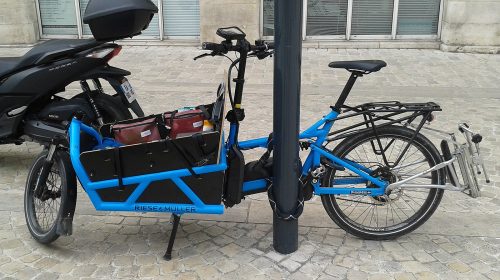
In new study, “Electric bicycles and cargo bikes—Tools for parents to keep on biking in auto-centric communities? Findings from a US metropolitan area” DCRP’s Dr. Allie Thomas explores how parents and caretakers purchase and use e-bikes to transport children. Through interviews of 20 e-bike users that had children or cared for children in the San Francisco Bay Area, Dr. Thomas looked at participants’ daily travel behaviors and their motivations, benefits, and challenges in e -bike use. Her findings indicate that participants found they were able to access more of their community by e-bike than by manual bike, and at times more access than by car. E-bikes increased female rider’s feelings of safety and were noted as having the potential to close some of the male-female gap between bike adoption.
“The reason why I got [my e-bike] was I felt like I was safer with it. When I was trying to get going even on the slightest hill with my kids I couldn’t get out of the intersection, and I was crossing a busy street I felt really exposed, and that for me is like the really great aspect of the electric assist—just getting moving. — Mother of two, Albany, CA
The article also noted some challenges that e-bike owners faced, including finding bike racks that were large enough to accommodate the bike and having access to a garage that would allow residents in apartments 1+ floors above ground to store their bike at home. Participants were also concerned with adverse weather and e-bike part theft. Others noted the social stigma and hefty price tag, but also qualified this with the cost savings of the mode-shift away from personal automobiles. These findings suggest that policymakers might encourage e-bike adoption through rebates or subsides and from e-bike piloting programs and bike share models that increase accessibility to women and less affluent communities.
Dr. Allie Thomas is an Assistant Professor at DCRP. She studies how best practices travel the globe and where they land. She uses ethnographic research methods to understand how “best practices” in transportation are adopted (or not) in developing economies, such as China, focusing on planners. Her US-based work focuses on electric bicycles and family travel. She is semi-fluent in Mandarin Chinese and has extensive experience living in China.